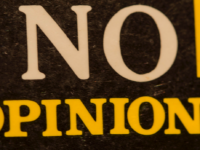Canada’s anti-spam law has been the target of intense criticism since its introduction in 2009 as the Electronic Commerce Protection Act. Even after the law passed in 2010, there was no shortage of effort to delay the regulations needed to put it into effect. Once it finally took effect in 2014, the criticism continued with a steady stream of fanciful suggestions that it would render promotions of neighbourhood lemonade stands illegal and warnings that the law would invariably be challenged in the courts and ruled unconstitutional. In 2017, just as critics were arguing for reforms to the law at the Industry Committee, the CRTC issued its ruling on the matter, determining that the law was in fact constitutional. The issue then proceeded to the Federal Court of Appeal, which last week unanimously upheld the constitutionality of law.
Archive for June, 2020
The LawBytes Podcast, Episode 54: Eric Goldman on Internet Platform Liability and the Trump Executive Order
The U.S. approach to Internet platform liability has been characterized as the single most important legal protection for free speech on the Internet. Over the past two decades, every major Internet service has turned to the rules to ensure that liability for third party content posted on their sites rests with the poster, not the site or service. Those rules have proven increasingly controversial, however, with mounting calls for the companies to take on greater responsibility for content posted on their sites. The issue captured international attention last month when U.S. President Donald Trump issued an Executive Order that heightens the pressure for change.
Eric Goldman is a Professor of Law at Santa Clara University School of Law in the Silicon Valley where he co-directs the High Tech Law Institute. He has written extensively about Internet liability and appeared before the US Congress to testify on the issue. He joins me on the podcast to discuss the history behind the U.S. approach, its impact, and the implications of the Trump Executive Order.
No Opinions Permitted: Broadcast Panel Rules Jokingly Criticizing Canadian Content During Radio News Segment Violates Code of Ethics
The Canadian Broadcast Standards Council has ruled that a news broadcast that jokingly criticized Canadian content violates the Canadian Association of Broadcasters’ (CAB) Code of Ethics and the Radio Television Digital News Association of Canada’s (RTDNA) Code of Journalistic Ethics. The complaint arose from a December 2019 broadcast on Toronto radio station CFRB. David McKee used his lead-in to a report on a possible Netflix tax to state “the libraries of streaming services like Netflix, Disney+ could soon have more of a Canadian flavour that nobody watches or wants if the federal government gets its way.”
The LawBytes Podcast, Episode 53: Welcome Development or Waste of Time? – A Conversation With Facebook Oversight Board Member Nicolas Suzor
Last month, Facebook revealed the names of the first 20 members of the Facebook Oversight Board, a body charged with conducting independent reviews of content removals. The group includes many well-known experts in the fields of human rights, journalism, law, and social media. The announcement received at best a mixed greeting – some welcomed the experiment in content moderation, while others argued that the board “will have no influence over anything that really matters in the world.”
Professor Nicolas Suzor of the Queensland University of Technology in Australia was named as one of the first 20 members. The author of Lawless: The Secret Rules that Govern our Digital Lives, Nicolas has been critical of Facebook and other Internet platforms and raised concerns about the oversight board when it was first announced. He joins me on the podcast to discuss the oversight board, the initial criticisms, and his views on how the board can have a positive impact in addressing complex issues that strive to balance freedom of expression with concerns about online harms. Note that our conversation was recorded before President Donald Trump issued an executive order targeting Internet platforms after Twitter fact-checked one of his tweets and issued a warning on another. The podcast will examine those latest developments in a future episode.










